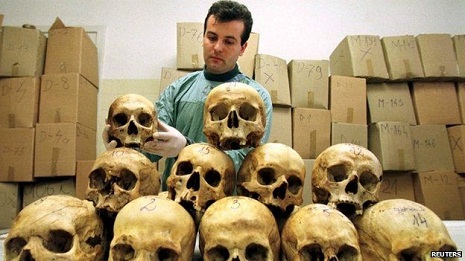The moment of heightened carnage pushed Clinton and other Western leaders to take action back then against a genocidal force the U.N. had warned for months might strike a very vulnerable spot.
Gen. Rupert Smith, commander of the U.N. Protection Force in Bosnia, had watched the Bosnian Serb Army advance on ground the U.N. had declared as safe areas. He feared it would retake them -- with ruthless consequences for Muslim civilians living there.
The massacre
Starting on July 11, 1995, for three days, the ethnic Serb forces gunned down Muslim boys and men in and around Srebrenica. The sight of their broken bodies dumped into mass graves, belongings lining roadsides, and carnage strewn across fields forced the world`s eyes onto a broader campaign of ethnic cleansing.
The extended slaughter of civilians, including children, women and old men in Bosnia-Herzegovina, took around 100,000 Muslim lives.
Weeks after Srebrenica, NATO jets bombed Bosnian Serb positions for two weeks in Operation Deliberate Force. The Serbs quickly surrendered, and months later both sides signed an accord worked out in Dayton, Ohio, establishing a peace that has lasted since.
Monument against cruelty
The Srebrenica memorial cemetery has become a monument against allowing a repeat of such carnage in Europe.
"In Srebrenica, Europe is faced with its shame," said EU High Representative Federica Mogherini.
"Europe failed to stand up to the promise of our founding fathers and to the dreams of their grandsons: no more war in Europe, no more murders in the name of race or the nation. No more genocides."
The war crimes led to the prosecution of former Serbian leaders in international courts. But many are not yet satisfied that justice has been done completely.
"Those who perpetrated that massacre must be brought to justice," U.S. Secretary of State John Kerry said in a statement. "And we must remember Srebrenica`s victims and all the victims of the war -- not just today but every day."
Russian U.N. veto
But old resentments galvanized by war have a way of hanging on.
Parties to massacre, and their allies, sometimes object to their killings being called genocide, and the United Nations was unable this week to muster the support in the Security Council to lend that term to the ethnic carnage in Srebrenica.
When it introduced a resolution, the Russian Federation, a permanent Security Council member and Serbian ally, vetoed it.
On Thursday, the European Parliament criticized the vote. "MEPs (parliamentarians) regret that the U.N. Security Council failed to pass a resolution commemorating the genocide and call for acceleration of war crimes prosecution at international and domestic level," it said in a statement.
Two U.N. judicial bodies, the International Criminal Tribunal for the Former Yugoslavia and the International Court of Justice, both recognize the massacre as genocide and have condemned Serbia`s ethnic cleansing campaign as "the biggest war crime in Europe since the end of the Second World War."
`Insults stated against Serbia`
Serbia, which is interested in joining the European Union, bristled at the criticism from Brussels.
"... The insults stated against Serbia regarding Srebrenica could in no way lead to a better future," its foreign ministry said in a statement.
And when Clinton and representatives of European Union countries take their places in front of the white pylon grave markers that stretch across the Srebrenica memorial cemetery, in neighboring Serbia there will reportedly be no official commemorations, as these were canceled.
A group of protesters are expected to lie down in front of the Serbian national assembly building in Belgrade to honor the dead.
More about:
















































